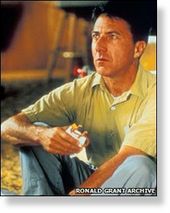
© BBC'Adam' - a new film that portrays autism
Hollywood movies rarely deal with disability - except for autism, when characters are typically shown as having special intelligence. Why do we like to think everyone with autism is especially gifted?
In one evening, he memorised every name and number from A to G in the phone book. While waiting for a meal in a restaurant, he committed the entire tableside jukebox to memory.
A dropped box of toothpicks? One glance and he is certain that 246 have spilt on the floor.
Other films since this 1988 release have depicted similar areas of brilliance that are sometimes associated with autism, known as savant qualities.

© BBCDustin Hoffman's Raymond Babbitt - setting the mould for autistic savant characters
His mind was like a computer and, for years, Dustin Hoffman's
Rain Man character has often been the first reference point for autism.
In 1998, for instance,
Mercury Rising told the story of a nine-year-old autistic boy who used his savant abilities to crack a $2bn encryption code.
And in
Mozart and the
Whale, a 2006 film about two savants with Asperger syndrome, a high-functioning type of autism, Josh Hartnett's character could glance at his watch and then calculate exactly how long he has had his job as a taxi driver.
The link between autism and savant skills in cinemas is clear, but does art really imitate life? Do people with autism always have an amazing intellectual skill?
"The simple answer is no," says Dr Stuart Murray professor of contemporary literature and film at the University of Leeds and author of the book
Representing Autism. "
By far, the majority of people with autism do not have any kind of savant ability."
'Autism celebrities'In fact, the current estimate is that one or two in 200 people with an autism spectrum disorder have a savant talent, according to the
National Autistic Society, although the exact numbers are still unknown in the UK.
Well known savants - including Kim Peek, who partially inspired
Rain Man, Steven Wiltshire, a London artist who can recall entire cityscapes after brief observation, and Daniel Tammet, author of
Born on a Blue Day, about living as an autistic savant - are the exception to the autism rule, Dr Murray says.
"These people are almost like autism celebrities," he says. "It's not something that crops up very much in the day to day life of living with autism."

© BBC
"It's a very sexy way of looking at autism," says Jonathan Kaufman, president of Disability Works in the US and technical consultant for
Adam, a new Hollywood film featuring a leading character with autism.
While his work with Adam, which went on general release in the UK at the weekend, was about capturing the day-to-day nuances of a person with Aspergers - something he wishes would happen more often - he understands why many films have seized on savants.
"It focuses on the almost superhuman nature of the disability itself," he says. "Somebody who is gifted has always had a place in society."
They tend to be the stories audiences want, says Dr Murray. Films about disabilities typically focus on two types of story lines, he says. Either:
* the disability provides some kind of incredible skill or quality that "makes up" for the negative, or
* the person finds a way to "rise above" adversity
"It doesn't seem to be as bad to be severely autistic if you're also skilled at maths or music," he says. "If it seems to be that with your disability comes an extraordinary ability, it takes away the worst aspects of being disabled."

© BBCStephen Wiltshire in a BBC documentary called 'Fragments of Genius'
This can be a comfort to audiences.
"
Everybody who is not disabled is fundamentally very scared by the possibility of becoming disabled," says Dr Murray.
But what about people who do have autism? While mainstream movies with autistic characters may increase awareness about the disability, how does it affect what the public expect of the condition?
"I have spoken to many families who say that they feel really depressed and devastated when they get this portrayal," says Uta Frith, emeritus professor of cognitive development at the University of College London.
While she understands films have artistic license to create compelling stories, the aftermath can be difficult for parents of children with autism.
"It seems almost like their fault that their child isn't like that."
And it can go beyond childhood. Robyn Steward, a 22-year-old in London with Asperger syndrome says some people still think she's the
Rain Man.
"
People expect you, as an autistic person, to be really good at maths, or a walking calculator," she says. In reality, she doesn't care much for numbers. "Everyone is an individual and has their own interests and not everybody is a savant. So maybe people see it in
Rain Man. But that's not the full story."
What type of story would Steward like to see on the big screen? Something a bit closer to her own experience, maybe with a character diagnosed later in life, she says.
Dr Murray agrees. As a father of two children on the autistic spectrum, he says he relates more to something like
The Black Balloon, an Australian film released last year. The story focuses on a family living with an autistic son and depicts scenes with the boy running down the street naked or throwing himself down on the supermarket floor.
It may not be as romantic as the story of a maths genius, but it's the reality, says Dr Murray.
"We've all had the supermarket thing happen. This rings true to us in a way that somebody doing the square root of a million and nine doesn't," he says.
The film was not a box office hit in the UK. It went straight to DVD.
The mundane isn't interesting and won't be portrayed on film, tv or stage. It doesn't sell. So the question is how to sell the message of truth on any subject? In a mass media format? And as usual, it is done through good storytelling, a rare thing indeed and why the Harry Potter series is such a phenomenon. And why its creator has to be on guard to protect her baby. That baby has grown up and engendered offspring of its own as all the bloggers and shippers demonstrate. It has taken on a life of its own.
Someone has to frame the conversation that others later join in and repeat. The mass media is a follower, a copier of original patterns, not a creator, and they only copy winners, not losers at the boxoffice. So find a story worthy of imitation. If it is truly unique like the Potter series, it stands above the crowd and established the new benchmark of success. One can find truth as exciting as lies if ready to discover its allure. Temptation can work both ways same as these stories on autism, another seeming virus let loose on society in recent decades. We see it as we see ourselves, when we are ready to look at that reflection. And we all need a little nudge.